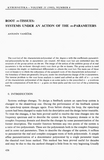Article
Full entry |
 PDF
(1.4 MB)
Feedback
PDF
(1.4 MB)
Feedback
 PDF
(1.4 MB)
Feedback
PDF
(1.4 MB)
Feedback
References:
[1] R. Abraham, J. E. Marsden: Foundations of Mechanics. Benjamin Publ. Co., London 1978. MR 0515141 | Zbl 0393.70001
[2] G. E. Alderson, P. M. Lin: Computer generation of symbolic network functions - A new theory and implementation. IEEE Trans. Circuit Theory CT-20 (1973), 48- 56.
[3] J. W. Archbold: Algebra. Pitman, London 1964. MR 0094293 | Zbl 0161.00903
[4] J. Bak, D. J. Newmann: Complex Analysis. Springer-Verlag, New York 1982. MR 0671250
[5] J. H. Blakelock: Automatic Control of Aircraft and Missiles. Wiley, New York 1965.
[6] W. Blaschke, G. Bol: Geometrie der Gewebe. Springer-Verlag, Berlin 1938. Zbl 0020.06701
[7] H. W. Bode: Network Analysis and Feedback Amplifier Design. Van Nostrand, Princeton 1945, 115-120.
[8] N. Bourbaki: Variétés Différentielles et Analytiques. Herman, Paris 1967. MR 0219078 | Zbl 0171.22004
[9] N. H. Clamroch: State Models of Dynamic Systems. Springer-Verlag, New York 1980. MR 0584265
[10] N. G. Čebotarev: Algebraic Functions Theory. (in Russian). OGIZ, Moscow 1948. MR 0030003
[11] J. C. Doyle: Guaranteed margins for LQG regulators. IEEE Trans. Automat. Control AC-23 (1978), 756-757.
[12] J. C. Doyle, G. Stein: Robustness with observers. IEEE Trans. Automat. Control AC-24 (1979), 607-611. MR 0538818 | Zbl 0429.93048
[13] W. R. Evans: Control system synthesis by root locus method. Trans. AIEE 69 (1960), 66-69.
[14] K. S. Fu: Sensitivity of a linear system with variations of one or several parameters. IRE Trans. Circuit Theory CT-7 (1960), 348-349.
[15] H. Haken: Higher Order Root-Locus Technique with Applications in Control System Design. Vieweg, Braunschweig 1981. MR 0671427
[16] P. Hippe: Partial fraction expansion and root locus method. Internat. J. Control 34 (1981), 1185-1194. MR 0643880 | Zbl 0472.93019
[17] S. S. L. Chang: Synthesis of Optimum Control Systems. McGraw-Hill, New York 1961.
[18] C. G. J. Jacobi: Über ein leichtes Verfahren die in der Theorie der Säcularstörungen verkommenden Gleichungen numerisch aufzulösen. J. reine angew. Mathematik 30 (1846), 51-94.
[19] T. Kailath: Linear Systems. Prentice-Hall, Englewood Cliffs 1980. MR 0569473 | Zbl 0454.93001
[20] T. Kato: Perturbation Theory for Linear Operators. Springer-Verlag, Berlin 1984. Zbl 0531.47014
[21] B. C. Kuo: Automatic Control Systems. Prentice-Hall, Englewood Cliffs 1982. MR 0147338 | Zbl 0542.93001
[22] P. M. Lin: A Survey of applications of symbolic network functions. IEEE Trans. Circuit Theory CT-20 (1973), 732-737.
[23] S. J. Mason, H. J. Zimmerman: Electronic Circuits, Signals, and Systems. Wiley, New York 1960.
[24] C. T. Pan, K. S. Chao: A computer-aided root-locus method. IEEE Trans. Automat. Control AC-23 (1978), 856-860. Zbl 0387.93019
[25] A. Papoulis: Perturbations of the natural frequencies and eigenvectors of a network. IEEE Trans. Circuit Theory CT-13 (1966), 188-195. MR 0245366
[26] I. Postlethwaite, A. G. J. MacFarlane: A Complex Variable Approach to the Analysis of Linear Multivariable Feedback Systems. Springer-Verlag, Berlin 1979. MR 0541148 | Zbl 0402.93001
[27] D. G. Retallack: Extended root-locus technique for desing of linear multivariable feedback systems. Proc. Inst. Electr. Engrs. 117 (1970), 618-622.
[28] G. Rosenau: Höhere Wurzelortskurven bei Mehrgrössensystemen. Preprints IFAC Symp. Multivar. Control. Systems, Düsseldorf, Tome 1, 1-9, 1968.
[29] M. Suzuki: Group Theory I. Springer-Verlag, Berlin 1982. (Trans, from Japanese.) MR 0648772 | Zbl 0472.20001
[30] K. Singhal, J. Vlach: Symbolic analysis of analog and digital circuits. IEEE Trans. Circuits and Systems CAS-24 (1977), 598-609. MR 0456993 | Zbl 0365.94064
[31] M. K. Tsai, B. A. Shenoi: Generation of symbolic network functions using computer software techniques. IEEE Trans. Circuits and Systems CAS-24 (1977), 344-346. Zbl 0365.94054
[32] A. Vaněček: Maximally Stable Control and Reconstruction. Academia, Prague 1984.
[33] V. C. M. Yeh: The study of transients in linear feedback systems by conformal mapping and the root locus method. Trans. ASME 76 (1954), 349-363.
[34] K. S. Yeung: Symbolic network function generation via discrete Fourier transform. IEEE Trans. Circuits and Systems CAS-31 (1984), 229-231. MR 0736439 | Zbl 0534.94005
[35] A. Vaněček: What is the Basic Problem of the Multivariable Control Synthesis?. Res. Rept. ČSAV-ÚTIA No. 1322, Prague 1985.

